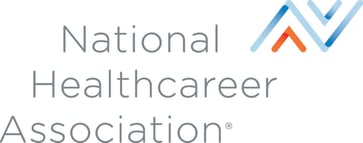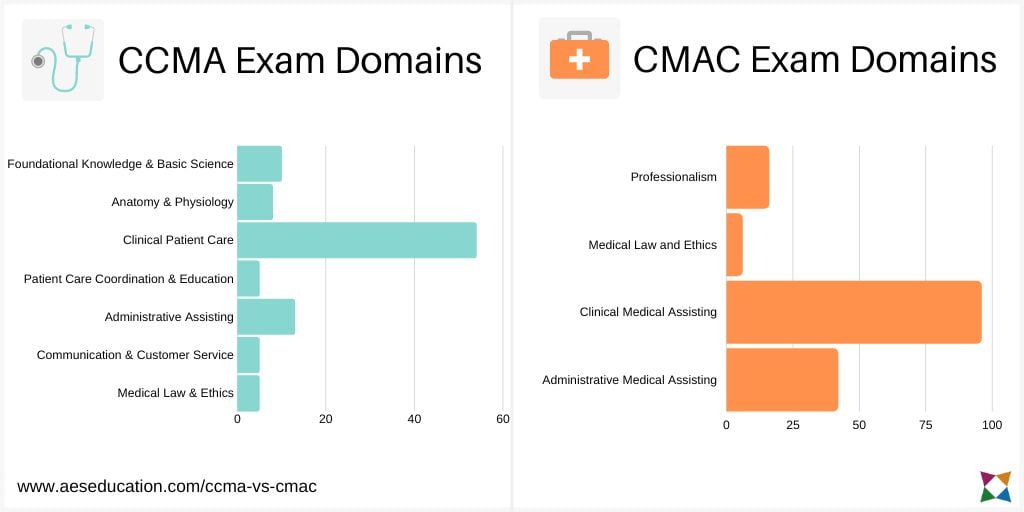Health Science | NHA CCMA | Medical Assisting | AMCA CMAC | Health Science Certifications
NHA CCMA vs. AMCA CMAC: What’s the Difference?
Coming from a family of educators, Brad knows both the joys and challenges of teaching well. Through his own teaching background, he’s experienced both firsthand. As a writer for iCEV, Brad’s goal is to help teachers empower their students by listening to educators’ concerns and creating content that answers their most pressing questions about career and technical education.
Medical assisting is one of the most popular health science classes in the country, and almost every one of those classes ends with a certification exam.
Two of the most common choices are the NHA CCMA certification and the AMCA CMAC certification.
But figuring out which one to use isn’t easy. The certifications have many commonalities and differences, and one may be a better fit for your program than the other.
So how do you decide?
In this post, we’ll go over three key points to consider when deciding which medical assistant certification to implement in your program:
- Eligibility requirements
- The cost of the exam
- The topics of the exam
Before we get into the details of the exams, it’s important to know some background on the certification providers—NHA and AMCA.
What Are the NHA and AMCA?
The NHA and AMCA are similar certification providers, but they have a few important differences.
In general, some teachers like the long-time track record of the NHA, while others like the wide variety of options available from the AMCA.
But there’s more to these organizations than this one difference.
First, we’ll look at NHA.
What Is the NHA?

The National Healthcareer Association (NHA) is a well-known provider of industry-recognized health science certifications.
NHA’s mission is “empowering people to access a better future,” which involves improving the quality of patient care and providing better opportunities for students to become healthcare professionals.
To meet this goal, the NHA provides eight health science certifications, including Certified Clinical Medical Assistant (CCMA).
Overall, the NHA has awarded more than 750,000 certifications since its founding in 1989.
What Is the AMCA?

The American Medical Certification Association (AMCA) is another health science certification provider that’s used across the country.
The AMCA’s vision is to “enhance the allied healthcare industry by providing national certification exams that validate the knowledge and expertise of professionals in this field.”
Compared with the NHA, the AMCA has a much more expansive list of certifications that include two categories: administrative certifications and clinical certifications.
In total, the AMCA provides 6 administrative certifications and 13 clinical certification options, including the Clinical Medical Assistant Certification (CMAC).
Though the AMCA was founded in 2010, it’s recognized as an excellent certifying organization across the US.
So now that you know a little bit about each certification provider, let’s get into the details!
We’ll start with one of the most common questions asked by teachers and students -- what are the eligibility requirements?
1. What Are the Certification Exam Eligibility Requirements?
Depending on the age of your students and where you teach, the eligibility requirements for each certification may differ.
That’s why it’s such an important point to consider when choosing a certification for your program!
NHA CCMA Exam Eligibility Requirements

To be eligible for the NHA CCMA exam, a candidate needs to meet two specific requirements set by the NHA.
First, the candidate must have a high school diploma or GED equivalent.
Second, they must have successfully completed a medical assistant training program or have work experience that falls under one of these categories:
- CCMA training program offered by an accredited or state-recognized provider
- Registered Apprenticeship Program in medical assisting that is registered with the US Department of Labor
- Formal medical training offered by a branch of the US Military in the medical assisting field
In addition, students must have worked at least one year in a medical assisting job if they’ve already graduated high school or completed their training more than five years before taking the exam.
But what about high school students who are looking to become clinical medical assistants?
High school health science students can take the test to earn a provisional NHA CCMA certification if they plan to graduate within 12 months from an accredited high school or GED program.
Provisional certifications are different because:
- The provisional certification expires 12 months after the exam date
- After graduating, the student must apply to have the provisional certification converted into a full certification
For more detail on both standard and provisional certifications, the NHA outlines all of the requirements in their Candidate Handbook.
AMCA CMAC Exam Eligibility Requirements

In order to hold an active AMCA CMAC certification, an individual must be at least 17 years old and have a high school diploma or GED equivalent.
In addition, they must meet one of the following requirements:
- Option 1: Graduate from a training program taken at an approved AMCA testing site
- Option 2: Graduate from a training program and have full-time work experience
- Option 3: Have one or more years of full-time work experience and be presently working in the field
The AMCA notes that high school CTE students are eligible to sit for their exams, but the certification will not be "active" until they turn 18.
For full details on the eligibility requirements for AMCA exams, review their exam eligibility page.
2. What Do these Medical Assistant Exams Cost?
When it comes to any resource for your classroom, you need to know how much it costs.
In some cases the cost can end up as the deciding factor for what your administration will approve!
So, how much can you and your students expect to spend on each of these exams?
How Much Is the NHA CCMA Exam?

The NHA charges a $160.00 application fee, which must be paid at the time of registering for the CCMA exam.
In some instances, this fee may be paid by an institution or employer—but that depends on each candidate’s individual case.
How Much Is the AMCA CMAC Exam?

Depending on the eligibility category someone falls under, the cost of the AMCA exam differs.
For students who have completed an AMCA-approved program in the past year, the exam fee is $139.00.
For candidates that are applying under eligibility option 2 or 3, an additional $25 application fee will apply.
Now that we’ve looked at cost, let’s take a look at each certification exam itself!
What Topics Are on the CCMA and CMAC Exams?
Though the CCMA and CMAC exams are both clinical medical assisting certifications, the tests are vastly different!
To start, the CCMA exam has 150 scored questions and 30 non-scored questions, while the CMAC exam has 160 scored questions and 15 non-scored questions.
In addition, the exams include different topics based on the skills each provider deemed as most important for someone to be considered certified.

Here’s what a student must know for each exam:
NHA CCMA Exam Topics

The NHA CCMA exam includes questions fall under seven topic areas, which the NHA calls “domains:”
- Foundational Knowledge and Basic Science
- Anatomy and Physiology
- Clinical Patient Care
- Patient Care Coordination and Education
- Administrative Assisting
- Communication and Customer Service
- Medical Law and Ethics
Each of these domains has a number of subtopics that are categorized as either knowledge statements or task statements.
The Foundational Knowledge and Basic Science domain includes what a medical assistant needs to know about medical terminology, healthcare systems, and other fundamental healthcare concepts.
The Anatomy and Physiology domain focuses on what a CCMA should know about body structure, organ systems, disease processes, and more.
The Clinical Patient Care domain is the largest portion of the NHA CCMA exam and includes five subsections related to general patient care, infection control, lab procedures, phlebotomy, and EKG testing.
The Administrative Assisting domain focuses on the administrative tasks that a medical assistant may be required to complete, such as scheduling and documentation.
The Communication and Customer Service domain ensures a medical assistant can communicate effectively with both patients and other healthcare workers.
The Medical Law and Ethics domain focuses on crucial healthcare topics such as advanced directives, patient privacy, and more.
Overall, your students must be proficient in a wide variety of knowledge and clinical skills to become certified as a CCMA.
You can see the full breakdown of the domains, knowledge statements, and task statements by reading the NHA’s CCMA test plan.
AMCA CMAC Exam Topics

The AMCA CMAC exam has questions that fall under four sections:
- Professionalism
- Medical Law and Ethics
- Clinical Medical Assisting
- Administrative Medical Assisting
The Professionalism section focuses on appropriate appearance, behavior, and communication when working in a healthcare setting.
The Medical Law and Ethics section ensures medical assistants follow healthcare regulations like HIPAA and the Patient’s Bill of Rights.
The Clinical Medical Assisting section is the largest on the exam and includes questions on infection control, EKG testing, collecting specimens and diagnostic testing, patient intake, assisting with physical examinations and procedures, and administering medications.
The Administrative Medical Assisting section tests students on office reception, medical record management, patient care coordination and education, billing and insurance, and medical office management.
Overall, the CMAC exam incorporates a well-rounded skill set that any medical assistant may need on the job.
The AMCA includes information about each section of the test on their exam blueprint, but you can also contact them to see their curriculum coverage recommendations.
Now that you know what each exam entails, there’s one last question to answer.
Is the NHA CCMA or AMCA CMAC Exam Right for You?
So which clinical medical assistant exam should you use?
Both options will set your students on a successful career path, but the specific knowledge and skills needed are different.
Depending on what state you’re in, the requirements for clinical medical assistants may vary. That’s why it’s crucial to choose the certification that best aligns with your local area needs!
However, if you need a curriculum to help you prepare students for either one of these exams, consider iCEV!
The iCEV Health Science curriculum is designed to prepare students for a wide variety of prominent certification exams, including both the NHA CCMA and AMCA CMAC.


